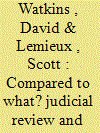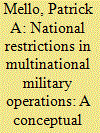| Srl | Item |
| 1 |
ID:
140201


|
|
|
|
|
| Summary/Abstract |
Many democratic and jurisprudential theorists have too often uncritically accepted Alexander Bickel's notion of “the countermajoritarian difficulty” when considering the relationship between judicial review and democracy; this is the case for arguments both for and against judicial review. This framework is both theoretically and empirically unsustainable. Democracy is not wholly synonymous with majoritarianism, and judicial review is not inherently countermajoritarian in the first place. In modern democratic political systems, judicial review is one of many potential veto points. Since all modern democratic political systems contain veto points, the relevant and unexplored question is what qualities might make a veto point relatively democratic. Proceeding on the assumption that democracy's primary normative value is found in its opposition to domination by both state and private actors, we make a preliminary effort to delineate what qualities a democratic veto point might have, identifying five criteria, and evaluate judicial review using these criteria. We conclude that judicial review's performance against these criteria is decidedly mixed, but in the final balance is likely to be a modest net positive for democracy, particularly when compared to other veto points commonly found in contemporary democratic political systems.
|
|
|
|
|
|
|
|
|
|
|
|
|
|
|
|
| 2 |
ID:
138120


|
|
|
|
|
| Summary/Abstract |
This paper argues that policy space ownership dynamics, political and historical institutional variables determine the implementation of reforms advocated within the context of the international transfer of public sector reform models to Africa. Through the case of the Malawi Hospital Autonomy reforms, this paper demonstrates that although policies transferred by international donor organisations to African countries through aid conditionality may be initially adopted so as to secure the much-needed developmental aid, the actual implementation of such reforms is not an automatic process. This is due to contextual factors, which in part include the neo-colonial struggle for policy ownership in the face of conditionality, path dependency tendencies and veto players that are constrained by deeply entrenched political and historical institutional proclivity that lead to policy stability even in the context of coercive policy transfer pressures. Taking a qualitative approach, the analysis combines the use of primary and secondary data. The study findings show that while other African countries successfully implemented such reforms, Malawi has not, due to specific implementation, historical, political and institutional factors.
|
|
|
|
|
|
|
|
|
|
|
|
|
|
|
|
| 3 |
ID:
166603


|
|
|
|
|
| Summary/Abstract |
Recent scholarship in security studies has started to explore the causes and consequences of various forms of national restrictions in multinational military operations (MMOs). This article makes a conceptual contribution to this literature by developing a theoretical framework of national restrictions in MMOs that distinguishes between structural, procedural, and operational restrictions. I argue that these types of restrictions are governed by different causal mechanisms. Structural restrictions are relatively stable over time and effect deployment decisions irrespective of other factors. Procedural restrictions, on the other hand, can constitute veto points against deployment only in combination with distinct political preferences. Finally, operational restrictions directly affect the rules of engagement of troop contributing countries. The article illustrates the three types of restrictions and their interaction with empirical examples from a range of countries and sketches their impact on MMO deployment decisions and mandates.
|
|
|
|
|
|
|
|
|
|
|
|
|
|
|
|